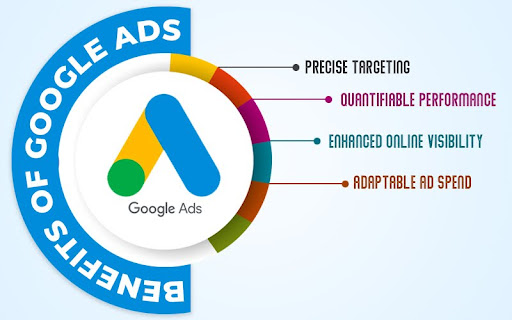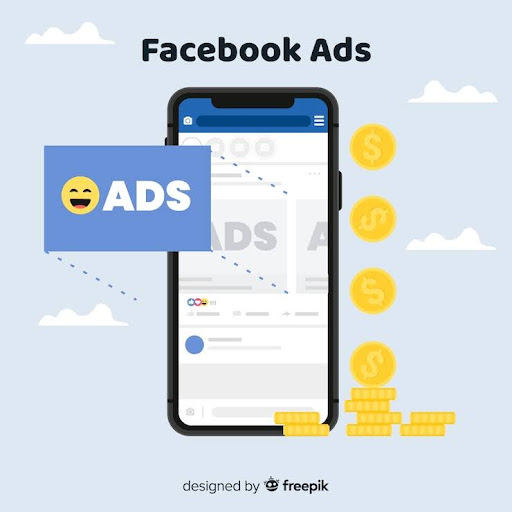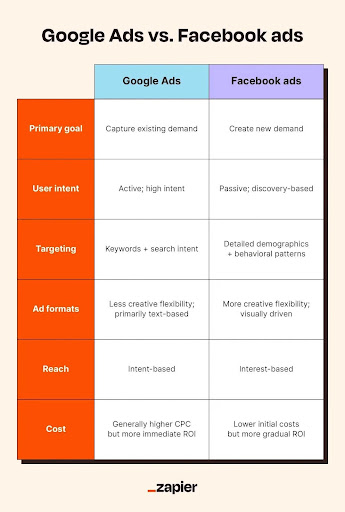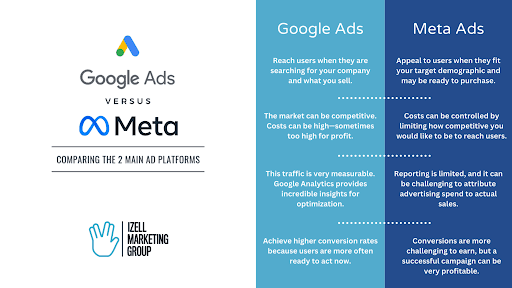When it comes to digital advertising, Google and Facebook dominate the conversation, and for good reason. Both platforms offer massive reach, advanced targeting, and serious revenue potential.
However, they operate very differently:
- Google Ads captures intent and connects you with users who are actively searching for what you sell.
- Facebook Ads, on the other hand, create discovery and put your brand in front of the right people before they even know they need you.
So, which one works better? That depends on:
- Your product
- Audience
- Goals
- Budget
In this post, we’ll compare Facebook ads and Google ads using real business use cases, cost comparisons, and conversion insights so you can choose the platform that fits your goals, not someone else’s strategy.
Let’s settle the debate: Facebook ads vs Google ads, who wins for your business?
Google Ads: Capture Active Intent
Google Ads lets you tap into active intent. When someone searches on Google, they already know what they’re looking for. This gives your ads the potential to meet them at the perfect moment of decision.

Why Choose Google Ads?
- Search Ads for Immediate Needs: Google Ads show up when users type in relevant keywords, and people who are looking for a solution right now.
- Higher Conversion Rates: Since users are already actively looking, they are more likely to convert.
- Broader Reach for Specific Queries: Whether selling a local service or a worldwide product, Google Ads enables you to reach any keyword or phrase your offering meets..
- Cost of Google Ads: While costs can vary, the cost of Google Ads tends to be higher for competitive keywords. However, high intent can mean a better return on investment (ROI).
Ideal for:
- Businesses targeting people with clear needs.
- B2C products, eCommerce stores, or any brand that relies on search-driven traffic.
- Campaigns aimed at generating high-conversion leads fast.
Facebook Ads: Target Potential Interest
Facebook Ads, however, work differently. They do not answer searches but generate interest and engagement. Facebook shows your ads to users based on what they like, what they do, and who they are.

Why Choose Facebook Ads?
- Discovery-Focused Ads: Facebook ads can reach users who might be unaware of your product but who, based on their profiles, might find it interesting.
- Lower Cost Per Click (CPC): Costs of Facebook ads is usually lower than Google CPC, especially if you are targeting demographics.
- Advanced Targeting: Facebook enables you to target users by age, location, interests, and behavior.
- Paid Social Campaigns: With paid social, you build demand instead of grabbing it.
Ideal for:
- Building brand awareness, especially for new products or services.
- Businesses aim to create interest in their offerings.
- Campaigns with a focus on engagement or remarketing.
A reliable Facebook Ads Management Services provider can help you run smarter campaigns that connect with the right users at the right time.
Breaking Down the Key Differences Between Google and Facebook Ads

When comparing Google Ads vs Facebook Ads, it’s clear they operate in radically different ways despite both being major online advertising platforms. These differences are the essence of picking the appropriate system for your enterprise.
1. Search vs Social
- Google Ads = users actively searching for something.
- Facebook Ads = users discover your brand while scrolling.
If you’re targeting ready-to-buy users, go for Google.
If you’re building awareness or interest, go to Facebook.
2. Ad Formats and Placements
- Google Ads: Focuses on search results (text-based), display ads, shopping, and YouTube video ads. It’s ideal for people ready to take action.
- Facebook Ads: Allows image, carousel, video, and story formats across Facebook, Instagram, Messenger, and more. Great for visual storytelling and brand engagement.
So if we’re talking display ads vs search ads, Google leans more toward search, while Facebook dominates visual display.
3. Audience Targeting
- Facebook’s power lies in its deep audience segmentation. You can target based on age, behavior, interests, job titles, or life events like engagements or relocations.
- Google’s targeting focuses more on keywords, location, device type, and previous browsing behavior via remarketing.
It’s the classic paid search vs paid social scenario.
If you’re unsure how this fits your business, a trusted management agency can guide your strategy across both platforms through PPC Campaign Essentials.
Real-World Scenarios: What Works Where?
When to Choose Google Ads
If you plan to scale campaigns effectively, getting help from an established Google Ads agency can refine bids, keyword planning, and performance monitoring, particularly in niche markets with significant competition.
Google Ads is most appropriate when you want to target individuals actually on the lookout for what you have.
Whether you’re a local plumber, an e-commerce store, or a SaaS business, Google Ads places your solution in front of customers when they need it most.
Example:
- eCommerce store selling custom shoes: A user searches for “custom sneakers online”, your ad shows up, and they click to buy.
- Local service provider (plumber, electrician, etc.): Someone searches for “emergency plumber near me”, your ad is right there.
Google Ads shines when you need to target high-intent users ready to convert now. It’s more about capturing existing demand.
When to Choose Facebook Ads
Facebook Ads works particularly well when you want to create awareness or interest for your products.
If your audience is not even aware of their need for your product or service, Facebook Ads can help educate them.
Example:
- Building a brand for a new clothing line: You highlight your collection via quality images or video, and customers may interact with your content without needing immediate intent to buy.
- Lead generation for real estate: You target potential buyers with property listings or homebuyer tips, creating interest that might turn into sales down the road.
Facebook Ads are ideal when your goal is creating demand and building a relationship with potential customers, even before they’re ready to purchase.
Cost Comparison: Google Ads vs Facebook Ads
Let’s talk about money.

Tracking PPC trends can help you understand where to invest and how to budget smarter across both platforms.
Facebook ads are generally less expensive than Google Ads cost, but that’s not the entire picture.
The cost of Facebook ads may be inexpensive due to a lower CPC, but it may be more difficult and time-consuming to convert users since they’re not necessarily searching for your product.
Cost for Google Ads
- Higher CPC due to high competition for popular keywords.
- Best suited for businesses that can handle higher acquisition costs but want more immediate conversions.
Facebook Ads Cost
- Lower CPC, especially for niche audiences.
- Best for businesses aiming to create brand recognition and ongoing interest at lower cost per click.
Combining Google Ads and Facebook Ads: A Powerful Duo
Using both, you can record different stages of the customer journey, from awareness (Facebook) to conversion (Google).
- Google Ads can potentially turn people who are actively looking for your product.
- Facebook Ads make it possible to target people who are not directly looking, but are willing to discover your brand.
Collectively, all these platforms constitute a balanced advertising strategy both for short- and long-term objectives.
A well-structured strategy using both platforms is part of modern PPC campaign essentials, helping businesses build awareness and drive conversions efficiently.
Final Thoughts
Your choice between Google Ads and Facebook Ads depends on your objectives, audience, and budget.
- If you’re attempting to corner demand and push immediate conversions, Google Ads is the way to go.
- Though, if you wish to create demand and build brand awareness in the long run, Facebook is the option you choose.
For most businesses, the true potential is in blending both.
Performance marketing is the future of digital advertising, and these two platforms are key players in your PPC strategy.
Need expert help in choosing and managing Google Ads or Facebook Ads?
Working with trusted partners can help businesses craft high-performing, data-driven ad campaigns across Google, Facebook, and beyond. With creative expression to conversion optimization, our specialists design campaigns that convert clicks into customers.




